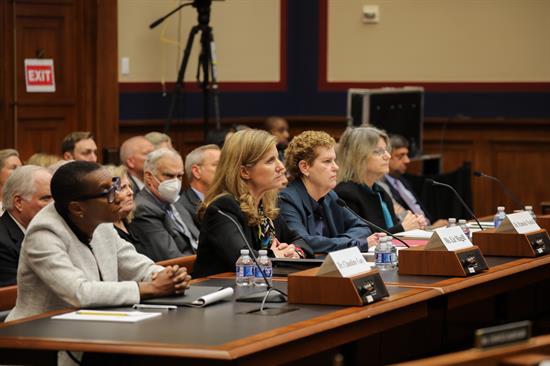By Andrew Adler
Community Editor

The presidents of three of the nation’s most pretigious universities testifying before a congressional subcommittee exploring antisemitism on college campuses.
L-R: Harvard’s Claudine Gay, Penn’s Elizabeth Magill, and MIT’s Sally Kornbluth (Photo: Committee on Education & the Workforce)
You’d think that anybody who rises to be president of Harvard, MIT or the University of Pennsylvania would have enough savvy not to botch testifying before a congressional subcommittee exploring antisemitism on college campuses. But that is precisely what Harvard’s Claudine Gay, MIT’s Sally Kornbluth and Penn’s Elizabeth Magill managed to pull off earlier this month.
The CEO’s of these so-called bastions of academic excellence couldn’t bring themselves to condemn – outright and unequivocally — speech any reasonably discerning person would recognized as hateful: calling for genocide.
Granted, this subcommittee was not the friendliest of venues. The principal interrogator was Representative Elise Stefanik, a New York Republican who has cannily positioned herself as a power player in conservative circles. There were moments in the back-and-forth where she was as much bent on tripping up her subjects as in drawing out clear answers. Such is the game of D.C. political sparring, and only the most naïve of guest participants would fall for the ruse before them.
Again, Stefanik’s question was simple enough:
“Ms. Magill, at Penn, does calling for the genocide of Jews violate Penn’s rules or code of conduct — yes or no?”
Magill’s answer: “If the speech turns into conduct it can be harassment — yes.
Stefanik: “I am asking specifically calling for the genocide of Jews — does that constitute bullying and harassment?”
Magill: “If it is directed and severely pervasive, it is harassment.”
Stefanik: “So the answer is yes?”
Magill: “It is a context-dependent decision.”
Here Magill was channeling her inner-lawyer — not surprising for a former dean of Stanford Law School. But that same lawyerly tack, that instinct to parse every phrase, every word, was her undoing. You’re being asked if advocating mass death for Jews is acceptable, and all you can answer is that it’s “context-dependent”?
Fallout was immediate, sharp, viscious. Donors pulled or threatened to pull gifts amounting to tens of millions of dollars. Magill, barely two years into one of the most prestigious academic gigs on earth, was hanging onto that gig by the barest of threads.
The very next day, in classic “what-I-really-meant-to-say” fashion, Penn issued a “clarification” in which Magill said: “In that moment, I was focused on our university’s longstanding policies aligned with the U.S. Constitution, which says that speech alone is not punishable. I was not focused on what I should have been — the irrefutable fact that a call for genocide of Jewish people is a call for some of the most terrible violence human beings can perpetrate.”
It must have been humbling — if not humiliating — for Magill to utter those words — assuming they were even her own. Indeed, it’s ironic that before she appeared on Capitol Hill, Magill was prepped by one of Philadelphia’s most prominent law firms. Didn’t anyone anticipate this most inevitable of questions? Couldn’t somebody have told her to reply in the simplest, most direct manner possible? “Calling for the genocide of Jews is not only bullying and harassment –it’s grotesque, deplorable and unacceptable under any circumstances. Period.”
But Liz Magill didn’t say that. She couldn’t bring herself to declare that such language, and the sentiments behind that language, goes far beyond any acceptable boundaries. Instead, she retreated into the shadow of blind tolerance. She failed Penn. She failed Jews. She failed herself.
Days later, after twisting in the winds of pervasive condemnation, Magill resigned. Harvard’s Gay managed to keep her job, barely, after the governing Harvard Corporation voted to back her. MIT’s Kornbluth, to her presumed relief, emerged with only a few scratches.
I followed this mini-saga closely as it lurched from day to day, place to place, threat to threat. Almost three months after the events of October 7, Jewish students at too many colleges and universities are under what amounts to siege. They’re being told to shelter in their dorm rooms, traverse their campuses in groups when they do out, and consider tucking their Stars of Davids out of public view. They deserve all possible support from the people who run these institutions. Instead, they must wonder if they’ll be safe — while their supposed guardians worry about context.
Andrew Adler is Managing Editor of Community



